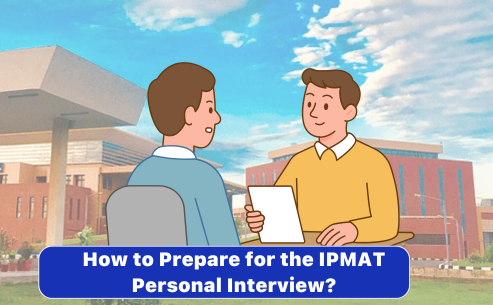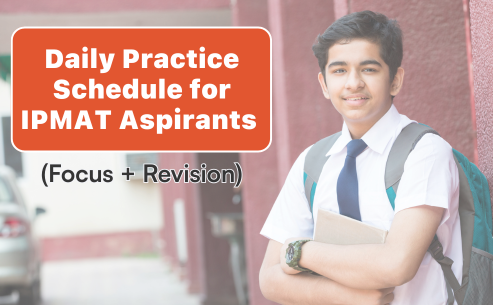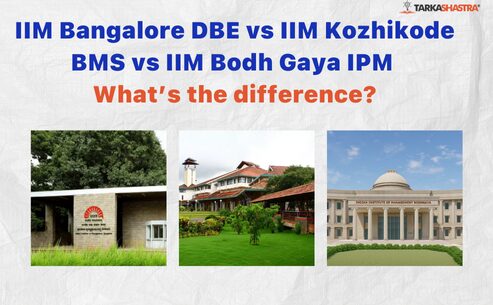Cracking the IPMAT written exam is only half the battle. What truly determines your admission into IIM Indore, Rohtak, Ranchi, or other participating institutes is your performance in the Personal Interview (PI).
The IPMAT PI is not a mere formality. It’s a decisive stage where the panel assesses your personality, thought process, motivation, and maturity—qualities that can’t be judged through an aptitude test alone.
Many students with borderline test scores make it through because of an exceptional PI. At the same time, some high scorers lose out due to a lack of preparation or confidence.
What is the IPMAT PI?
| Feature | Details |
| Mode | Online (Zoom/Google Meet) or Offline (campus-specific, varies yearly) |
| Duration | 10 to 20 minutes |
| Panel | 2–3 IIM faculty or external experts |
| Weightage | 20% to 35% of total score (varies by institute) |
| Language | Primarily English, but fluency is not the sole judging parameter |
The IPMAT PI is your chance to showcase who you are beyond marks—your curiosity, goals, awareness, and suitability for the 5-year Integrated Programme in Management (IPM). Unlike school viva exams, this interview probes your clarity of thought, confidence under pressure, and alignment with IIM values.
Why You Must Take This Stage Seriously
- A High-Scorer Can Be Rejected: Even a 300+ score in IPMAT Indore can’t save you if you falter in your interview.
- A Balanced Candidate Gets Selected: The interview gives you a chance to shine even if your test score is just around the cutoff.
- The PI Tests Real-World Readiness: Can you handle pressure, express opinions, and engage in meaningful conversations?
Tarkashastra Tip: “Treat the PI like your first IIM classroom interaction, not a test. It’s not about perfection. It’s about authenticity and self-awareness.”
Understanding the IPMAT PI Process
Before diving into preparation strategies, it’s important to understand what the IPMAT Personal Interview process actually involves, which institutes conduct it, how students get shortlisted, and what kind of evaluation criteria are followed.
Institutes That Conduct the IPMAT PI
| IIM Campus | Mode of Admission | Personal Interview (PI)? | Notes |
| IIM Indore | IPMAT Indore | Yes | Conducts rigorous PIs post shortlisting |
| IIM Rohtak | IPMAT Rohtak | Yes | Online PIs; structured panel interviews |
| IIM Ranchi | IPMAT Indore + Separate PI | Yes | Accepts Indore score; conducts its own PI |
| IIM Jammu | JIPMAT (via NTA) | No | Admission based only on JIPMAT score |
| IIM Bodh Gaya | JIPMAT (via NTA) | No | Admission based only on JIPMAT score |
Note: PI processes for private universities like NALSAR or TAPMI may differ and follow additional rounds like WAT or SOPs.
Shortlisting Criteria for IPMAT PI
Only candidates who meet the cutoff criteria for their respective entrance tests (IPMAT Indore or Rohtak) are shortlisted. The cutoffs are not just overall; in the case of IIM Indore, sectional cutoffs must also be met.
General Shortlisting Trends
| Institute | Basis of Shortlist | Selection Ratio | Safe Score (Gen) |
| IIM Indore | Overall + Sectional Cutoffs (QA-SA, QA-MCQ, VA) | ~4% | 300+ |
| IIM Rohtak | Overall Score (Normalized) | ~6% | 400+ |
Only around 800–850 students are shortlisted per institute for the PI, out of tens of thousands of test-takers.
What Happens in the IPMAT PI?
| Area Evaluated | What It Means |
| Personality Fit | Are you curious, adaptable, and motivated enough for a 5-year IIM journey? |
| Communication Skills | Not fluency, but clarity of thought, articulation, and body language |
| Academic Readiness | Do you have conceptual clarity in your school subjects? |
| Awareness | Are you in touch with national/international issues? |
| Self-Awareness | Do you know your strengths, weaknesses, and motivations? |
Panelists don’t look for “perfect” answers. They look for the presence of mind, honesty, and structured thinking.
What Are Interviewers Looking For?
One of the biggest myths about personal interviews is that you need to have all the “right” answers. In reality, the IPMAT interview panel is less interested in “perfection” and more focused on understanding who you are as a person.
Their goal is to evaluate whether you’re ready for the academic rigor, peer group, and culture of an IIM at such a young age.
Here’s what they’re genuinely assessing:
Key Traits Interviewers Look For
| Trait | What They Observe During the Interview |
| Clarity of Thought | Are your answers structured and logical? Or do you ramble and contradict? |
| Authenticity | Are you trying to sound “coached” or are you speaking honestly? |
| Motivation | Why do you want to pursue management? Why IPM? Why this IIM? |
| Academic Readiness | Can you explain school-level concepts clearly? Do you enjoy learning? |
| Communication Skills | Do you speak confidently? Are your ideas easy to follow? |
| General Awareness | Are you aware of current events? Can you form an opinion if asked? |
| Emotional Maturity | How do you handle a question you don’t know? Are you open to feedback? |
| Cultural Fit | Would you thrive in an IIM classroom with smart, diverse, and ambitious peers? |
Real Examples of “Good” Responses
| Question Asked | What a Strong Answer Might Look Like |
| Why do you want to join IPM? | “I believe the 5-year IPM program will give me a blend of analytical and managerial training early in life. I like working with people, and I’m curious about how businesses run.” |
| What’s your biggest weakness? | “I tend to overcommit to tasks at times, which affects my work-life balance. I’ve been working on managing time better using to-do lists.” |
| What did you learn from Class 12 Economics? | “I found the concept of demand elasticity fascinating—it showed how pricing decisions can directly impact consumer behavior.” |
Tarkashastra Tip:
“The interview isn’t a knowledge test. It’s a mirror. Be honest, be reflective, and show you’re someone who learns fast and thinks clearly.”
Step-by-Step Preparation Strategy for IPMAT PI
Preparing for the IPMAT PI isn’t about memorising answers. It’s about building self-awareness, clarity of thought, and presence of mind. This section breaks down a foolproof, step-by-step strategy that every serious aspirant should follow.
1. Know Your Profile Inside-Out
Most interviews begin with “Tell me about yourself.” A vague or generic response here sets the wrong tone.
Build Your Profile Sheet:
| Element | What to Prepare |
| Personal Intro | 60-second summary of your background, family, interests, goals |
| Academic Story | Subjects you liked/disliked, your Class 10 & 12 journey, favorite topics |
| Achievements | Be ready to talk about competitions, internships, or unique learning moments |
| Hobbies & Interests | Prepare answers like: “Why do you like it?”, “What have you learned from it?” |
| Why IPM? Why IIM X? | Link your motivation to career goals, learning preferences, and exposure |
2. Brush Up Your Academics
Panelists often ask subject-based questions, especially from Math, Economics, Business Studies, or English.
What to Do:
- Revise key Class 11 & 12 topics (especially the ones you scored well in)
- Be ready to explain basic formulas and definitions in your own words
- Don’t panic if you forget something—just explain how you’d approach it
Tip: If you had poor grades in any subject, prepare a positive, non-defensive explanation.
3. Practice Common HR Questions
While every interview is unique, many questions follow a pattern. Prepare well for these foundational ones.
Most Asked IPMAT PI Questions:
| Question Type | Examples |
| Introductory | Tell me about yourself. |
| Motivational | Why management after Class 12? Why IPM and not traditional BBA + MBA? |
| Strengths & Weaknesses | What is your greatest strength? One weakness you’re working on? |
| Career Vision | Where do you see yourself in 5 or 10 years? |
| Hobbies | What do you read/watch/play and why? |
| Backup Plan | What if you don’t get selected? |
Tarkashastra Tip: Don’t over-rehearse these answers. Just think them through and internalise your logic.
4. Stay Updated with Current Affairs
You won’t be quizzed on GK like in school, but the panel may ask your views on recent events, government schemes, global trends, or even ethical dilemmas.
How to Prepare:
- Read The Hindu or Indian Express editorials daily
- Follow 1–2 YouTube channels or podcasts summarising news
- Pick 3–5 current events and prepare 1-minute opinions on them
| Sample Current Affairs Topics (for 2026 PI) |
| Indian elections and youth participation |
| India’s startup ecosystem |
| Climate change and sustainability |
| Budget 2026 highlights (education, economy) |
| Digital economy and AI in education |
5. Develop Your Personal Story
An authentic, coherent personal narrative helps you stand out. The panel should feel: “This student knows who they are and why they’re here.”
Build Your Narrative Using the 3C Framework:
| Element | Description |
| Context | Where you come from—academics, interests, background |
| Choice | Why you chose to apply to the IPM program |
| Connection | How the program aligns with your personality, goals, and long-term vision |
Tip: Don’t claim you want to “change the world” unless you have a real story to back it.
Mock Interviews – The Game-Changer
Practicing for your personal interview without mock interviews is like preparing for a cricket match without ever facing a bowler. Mocks simulate real conditions and help you refine your delivery, body language, clarity, and stress management.
Why Mock PIs Are Crucial
| Benefit | What It Helps With |
| Real-Time Simulation | Helps you manage nerves and answer under pressure |
| Feedback from Experts | Identifies gaps in your structure, tone, or content |
| Self-Awareness Boost | Reveals blind spots in your intro, hobby, or “Why IPM” answers |
| Posture & Body Language | Helps you correct facial expressions, slouching, or nervous tics |
| Time Management | Trains you to be concise without sounding robotic |
How Many Mock Interviews Should You Do?
| Stage of Preparation | Ideal Number of Mocks | Focus Area |
| 1st 2 Weeks (Basic Prep) | 1–2 | Identify natural strengths and weaknesses |
| Mid-Prep Phase | 3–4 | Practice depth questions + body language refinement |
| Final Week | 2–3 | Improve articulation, pace, and mental calmness |
| Total Recommended | 6–8 mocks minimum | Spread over 2–3 weeks for maximum improvement |
Common Mistakes Students Make in Mocks
| Mistake | How to Avoid It |
| Memorizing entire answers | Focus on core ideas, not exact wording |
| Ignoring feedback | Take notes, work on improvement areas between mocks |
| Speaking too fast or too soft | Practice voice modulation and pacing |
| Using heavy vocabulary unnecessarily | Keep your language simple, clear, and confident |
How Tarkashastra Helps
Tarkashastra offers 1-on-1 mock PI sessions with:
- IIM alumni and trained faculty
- Personalized feedback on tone, content, and structure
- Access to interview question banks and PI masterclasses
- Recordings to help students review their own performance
Tarkashastra Tip: “It’s not your first answer that matters—it’s your second and third answers under pressure that reveal who you really are. Practice them.”
Presentation Matters – Non-Verbal Communication
In personal interviews, how you say something often matters as much as what you say. Your posture, eye contact, facial expressions, and attire silently communicate confidence, nervousness, or sincerity—even before your words begin to matter.
Let’s decode how to ace the non-verbal game in the IPMAT PI.
Non-Verbal Cues to Master
| Cue | What Panelists Observe | What You Should Do |
| Eye Contact | Are you confident or dodging questions? | Look at the camera (for online) or at panelists (offline) |
| Facial Expressions | Are you blank, fidgety, smiling, or too serious? | Maintain a calm, neutral, and friendly expression |
| Posture | Slouching shows disinterest | Sit upright, feet flat, hands on lap or table |
| Hand Movement | Too much = distraction; too little = stiffness | Use minimal, natural gestures to support your answers |
| Nervous Habits | Touching face, shaking legs, clicking pen | Record a mock to become aware and consciously control them |
Online Interview Etiquette (If Conducted Virtually)
| Aspect | Best Practice |
| Background | Plain wall or tidy background with good lighting |
| Internet Connection | Use a LAN or stable Wi-Fi; test Zoom/Meet beforehand |
| Camera Angle | Frame your face at eye-level—not too low or looking up your nose |
| Noise & Distractions | Inform family, turn off notifications, and silence the phone |
| Tech Backup | Keep a second device/hotspot ready in case of disconnection |
Tarkashastra Tip: “Your eyes and your smile are your most powerful non-verbal tools. Use them to show interest, not intimidation.”
Dress Code: First Impressions Matter
| Gender | Recommended Attire |
| Boys | Formal shirt (light color), dark trousers, clean shoes |
| Girls | Salwar-Kameez, Kurti & Pants, or a formal top & trousers |
| All | No flashy accessories, clean grooming, subtle hairstyle |
Even in online PIs, dressing professionally improves your own mindset and helps the panel take you seriously.
Institute-Specific Interview Focus Areas
While all IPMAT personal interviews aim to assess your readiness for the 5-year IPM journey, each IIM has its own unique expectations and questioning style. Being aware of these nuances can give you a tactical advantage.
Let’s break down what to expect at each major institute:
A. IIM Indore
Interview Style:
- More abstract and situational
- Focuses on clarity of thought and articulation
- Can include academic and logic-based questions
- May probe into Short Answer questions you attempted in the written test
Likely Questions:
| Theme | Sample Questions |
| Academics | “What’s the difference between mean and median?” |
| Personality Fit | “Why do you think you’re a good fit for a 5-year management program?” |
| Situational | “What would you do if you had to lead a team of people older than you?” |
| General Awareness | “What are your views on India’s startup policy?” |
Indore Pro Tip: They value originality. Don’t fake a story—reflect genuinely on your goals and interests.
B. IIM Rohtak
Interview Style:
- More structured and panel-led
- Slightly more factual or HR-style than Indore
- Emphasis on academic performance, goals, and awareness
Likely Questions:
| Theme | Sample Questions |
| Profile-Based | “You’ve studied Biology. Why management?” |
| Current Affairs | “Tell us about the Union Budget’s impact on education.” |
| Clarity of Purpose | “Where do you see yourself in five years?” |
| Backup Plans | “What’s your alternative if you don’t get into IPM?” |
Rohtak Pro Tip: Be prepared to explain your choice to pursue IPM in a logical, grounded way.
C. IIM Ranchi
Interview Style:
- Balanced between Indore and Rohtak
- Welcomes reflections on self-awareness, hobbies, and social awareness
- Can include scenario-based questions and logical reasoning
Likely Questions:
| Theme | Sample Questions |
| Ethical Reasoning | “Would you report a friend cheating in an exam?” |
| Hobbies & Interests | “What have you learned from playing chess?” |
| Social Perspective | “What are your views on online education post-COVID?” |
| Academic & Career Link | “How does Economics align with your long-term goals?” |
Ranchi Pro Tip: Be prepared for deeper “why” questions—reflect on your choices.
Institute-Wise Interview Comparison
| Criteria | IIM Indore | IIM Rohtak | IIM Ranchi |
| Interview Type | Analytical + Abstract | Structured + Profile-led | Balanced + Opinion-based |
| Question Depth | High | Moderate | Moderate to High |
| Panel Style | More conversational | Formal and time-bound | Mixed panel (2–3 interviewers) |
| Emphasis Area | Thought Process | Clarity of Goals | Ethics, Awareness, Profile |
| Prep Strategy | Reflective + Creative | Crisp + Purposeful | Balanced + Curious |
Sample IPMAT Interview Questions
The best way to prepare for your IPMAT PI is to familiarize yourself with the types of questions asked across various themes—not to memorize answers, but to practice your thought process and structure.
Below is a categorized list of commonly asked and high-probability IPMAT PI questions, based on past student experiences and mock interviews at Tarkashastra.
A. Personal Introduction & Background
| Question Type | Sample Questions |
| Self-Introduction | “Tell us about yourself.” |
| Family Background | “What does your father/mother do? How has that influenced you?” |
| Home City Awareness | “What is your city known for? Any major industries or issues there?” |
| Strengths & Weaknesses | “What’s one strength and one weakness you’re working on?” |
| Unique Factor | “What’s one thing about you that we won’t find in your form?” |
Unique Factor “What’s one thing about you that we won’t find in your form?”
B. Academics & Subject Knowledge
| Question Type | Sample Questions |
| Subject-Specific | “What’s the difference between GDP and GNP?” (Economics) |
| Application Questions | “Can you explain compound interest with a real-world example?” |
| Poor Scores Justification | “Your math marks are low in Class 11—what happened?” |
| Favorite Subject | “Which is your favorite subject and why?” |
| Interdisciplinary | “How does Psychology help in understanding business?” |
C. General Awareness & Current Affairs
| Question Type | Sample Questions |
| Opinion-Based | “What are your views on social media regulation in India?” |
| Business Awareness | “Tell us about a company that recently went public (IPO).” |
| Government Schemes | “What is the Digital India Mission?” |
| Global Issues | “What do you know about climate change and India’s stance?” |
| Education Policy | “What are your thoughts on the New Education Policy (NEP)?” |
D. Career Goals & Motivation
| Question Type | Sample Questions |
| Why IPM? | “Why are you choosing a 5-year program right after school?” |
| Why IIM X? | “Why IIM Indore and not Rohtak or Ranchi?” |
| Career Vision | “What kind of role do you see yourself in after MBA?” |
| Backup Plan | “What if you don’t get through IPM this year?” |
| Role Models | “Who is your role model in business or leadership, and why?” |
E. Situational & Abstract Thinking
| Question Type | Sample Questions |
| Ethics & Dilemmas | “What would you do if your team is failing due to one member’s laziness?” |
| Hypothetical | “If we give you ₹10 crore to start a company, what would it be?” |
| Abstract | “Define success in your own words.” |
| Teamwork | “Tell us about a time you worked in a group and faced conflict.” |
| Decision-Making | “Would you prioritize profitability or sustainability?” |
Tarkashastra Tip: Practice with a friend or mentor. Say your answers out loud—not just in your head. It builds fluency and reduces hesitation under pressure.
Real Experiences from IPMAT Toppers
Nothing prepares you better than the experiences of students who’ve already been through the grind. These real-life accounts from IPMAT toppers reveal what the interview actually feels like—and what separates the selected from the rejected.
Let’s look at some reflections from successful IPMAT aspirants trained at Tarkashastra and elsewhere.
Aarav Sharma – IIM Indore Admit (2024)
“I had a decent score in the written test, but my SA section was just above the cutoff. What helped me crack the final shortlist was my clarity in ‘Why IPM’ and how I connected it with my interest in behavioural economics.”
Panel Questions Asked:
- Why management after school?
- Tell us one news article that made you think recently.
- What is the difference between mean and median?
Learning: Be prepared to connect your academic interests with future goals. Show depth.
Simran Kaur – IIM Rohtak Admit (2024)
“I was a topper in school but I almost missed the cutoff in the verbal section. During the interview, they asked me about political awareness, my opinion on NEP, and even grilled me on my time management style.”
Panel Questions Asked:
- What do you think about the new education reforms?
- What challenges do students in rural India face?
- Tell us how you manage stress during exams.
Learning: Don’t underestimate general awareness, and be authentic about your experiences.
Kunal Mehta – IIM Rohtak Admit (Commerce Stream)
“Coming from a commerce background, I thought I’d be safe. But the panel asked me logic-based questions and gave me a tricky moral dilemma. Thankfully, my mock PI training helped me think on my feet.”
Panel Questions Asked:
- If your teammate cheats in a project, would you report them?
- Should business ethics be taught in school?
- What is the GST, and why is it important?
Learning: Even commerce students must prepare for ethical, abstract, and logical questions.
Key Takeaways from Toppers’ Experiences
| What Helped Them Succeed | Why It Worked |
| Personalized Answers | Made them stand out from generic applicants |
| Strong ‘Why IPM’ clarity | Showed seriousness about the program |
| Comfort with abstract questions | Helped them stay composed in unexpected moments |
| Mock Interview Practice | Improved articulation and confidence |
| Staying Updated on Current Events | Helped them add value and depth to their responses |
Tarkashastra Tip: “You don’t need to be extraordinary. You need to be self-aware, sincere, and smart in your delivery.”
Common Mistakes to Avoid in the IPMAT PI
Even well-prepared students can stumble in the IPMAT personal interview—not because they lack knowledge, but because they fall into avoidable traps. Below are the most common mistakes made by aspirants, along with simple ways to avoid them.
1. Memorising and Repeating Scripted Answers
Why It Fails:
Interviewers can instantly spot rehearsed answers. You sound robotic, not authentic.
What to Do Instead:
Practice your ideas, not lines. Stay natural and adapt based on how the conversation flows.
2. Lacking Clarity on “Why IPM?”
Why It Fails:
Generic responses like “IIMs are the best” or “I want to do MBA” don’t show real intent.
What to Do Instead:
Reflect on why you want a 5-year program right after school. Link your interests to management, the interdisciplinary curriculum, or early leadership ambitions.
3. Faking Achievements or Interests
Why It Fails:
The panel may probe deeper. If you can’t back it up, it damages your credibility.
What to Do Instead:
Be honest. Even if your profile is simple, sincerity is far more impressive than exaggeration.
4. Over-Explaining or Rambling
Why It Fails:
Long-winded answers confuse the panel and reduce impact.
What to Do Instead:
Use the PREP method – Point, Reason, Example, and Point again. Stay within 60–90 seconds.
5. Ignoring Verbal & Non-Verbal Balance
Why It Fails:
Shaky tone, fidgeting, poor eye contact, or lack of modulation creates a bad impression, even if your content is excellent.
What to Do Instead:
Record your mock interviews. Watch your body language, eye movement, and tone. Improve what’s visible.
6. Not Researching the Institute
Why It Fails:
If asked “Why IIM Indore?” and you fumble, it shows disinterest.
What to Do Instead:
Read about the institute’s pedagogy, campus culture, and unique features like international immersion or interdisciplinary courses.
Quick Recap: IPMAT PI Mistakes to Avoid
| Mistake | What to Do Instead |
| Memorised answers | Prepare key ideas, not full scripts |
| Vague motivation | Build a personal, logical “Why IPM” story |
| Fake achievements | Stick to honest, explainable experiences |
| Over-explaining | Use structured, to-the-point responses |
| Nervous body language | Practice with mirror/video and get feedback |
| No institute-specific knowledge | Read the program details of IIM Indore, Rohtak, Ranchi, etc. |
Tarkashastra Tip: “In PI, your goal is not to impress—it’s to connect. Be real, be thoughtful, and be ready to pause before you speak.”
Final Tips to Ace Your IPMAT PI
By now, you know what the IPMAT PI tests, what kind of questions to expect, and what pitfalls to avoid. Let’s wrap up your preparation strategy with some final, field-tested tips to help you shine in those critical 15–20 minutes.
1. Be Honest, Not Perfect
Truth > Performance.
If you don’t know the answer, say so gracefully: “I’m not aware of the specifics, but I’d be excited to learn more about it.”
Honesty shows maturity. Faking shows insecurity.
2. Start with Structure
Use a simple mental template like PREP (Point – Reason – Example – Point again) or STAR (Situation – Task – Action – Result) to answer behavioural questions. This shows clarity, not chaos.
3. Prepare but Don’t Rehearse
Yes, you need to prepare answers for common questions—but don’t memorize them word-for-word. Sounding rehearsed lowers your impact.
Instead, bullet your ideas and practice speaking naturally.
4. Ask Yourself “Why” for Every Claim
If you say, “I love leadership,” be ready for: “Tell us about a time you led something.” “What did you learn from it?”
Depth comes from reflection. Not just surface-level statements.
5. Record, Review, Refine
Do 2–3 mock interviews on camera (even your phone works). Watch your expressions, hand movements, tone, pace, and smile.
Then work on:
- Reducing filler words (like, um, so)
- Keeping answers under 90 seconds
- Pausing instead of rushing
6. Treat It Like a Conversation, Not an Exam
The panel isn’t testing your memory. They want to talk to you, get to know you, and see if you’re ready for IIM life.
So breathe. Smile. And engage.
Quick Checklist Before Your PI Day
| Task | Status ✔️ |
| 60-sec intro well-practiced | ✔️ |
| 3–5 current affairs topics ready | ✔️ |
| Personal story aligned with IPM | ✔️ |
| Academic strengths revised | ✔️ |
| Mock interviews done (min. 5) | ✔️ |
| Non-verbal cues reviewed | ✔️ |
| Attire prepared | ✔️ |
Tarkashastra Tip: “You don’t need a high IQ to crack the PI. You need high self-awareness, genuine interest, and the ability to think before you speak.”
How Tarkashastra Prepares You for IPMAT PI
At Tarkashastra, we don’t just help students crack the IPMAT written exam—we ensure they walk into the personal interview room with clarity, confidence, and composure.
Our unique approach blends expert mentorship, structured training, and personalized feedback, making us a trusted partner for hundreds of IIM aspirants across India.
What Sets Our PI Prep Apart?
| Feature | How It Helps You |
| 1-on-1 Mock Interviews | Simulates real interviews with IIM alumni and experienced mentors |
| Customized Feedback Reports | Gives you specific improvement areas: content, delivery, and tone |
| Recorded Sessions | Lets you rewatch, self-assess, and track progress over time |
| Current Affairs Capsules | Prepares you for opinion-based and trending topic questions |
| PI Question Bank Access | 200+ previously asked questions categorized by theme |
| Personal Branding Support | Helps you craft a strong, authentic “Tell Me About Yourself” answer |
| Group Discussion Add-ons | For institutes where GD is part of the process |
Mentors Who’ve Been There
Our panel includes:
- IIM Indore, Rohtak, and Ranchi alumni
- CAT 99+ percentilers
- Industry professionals from consulting, analytics, and finance
They know what interviewers look for—and they’ll help you think, speak, and present like a future IIM graduate.
Real Outcomes
| Result Metric | Outcome Achieved (2024) |
| PI Shortlist Conversion Rate | 81% of students trained for PI got final admission |
| Average Mock Interviews Taken | 6–8 per student |
| Most Improved Area | Clarity in “Why IPM” & structured speaking |
| Common Feedback from Students | “Mock PIs helped me stay calm and confident.” |
Tarkashastra Promise:
“We don’t believe in coaching clones. We prepare confident individuals—each with their own story, their own voice.”
Conclusion
The IPMAT Personal Interview isn’t just another stage in the admission process—it’s your gateway into India’s most prestigious business schools.
It’s not designed to intimidate you, but to discover the real you, beyond your test score.
With proper preparation, structured practice, and guidance from mentors who understand what IIMs are really looking for, you can walk into your PI room with confidence.
- Whether you’re from Science, Commerce, or Humanities…
- Whether you’re a school topper or someone with a passion for solving real-world problems…
You have a story worth telling. You just need to practice how to say it well. And that’s precisely what the IPMAT PI demands—not perfection, but self-awareness, motivation, and the ability to think clearly under pressure.
Final Words from Tarkashastra
At Tarkashastra, we believe that interviews are won before you enter the room. Through mock interviews, personalized training, and mentorship from IIM alumni, we help you bring out your most authentic and impressive self.
So, don’t fear the PI. Prepare for it. Practice it. Own it.
Ready to take your PI preparation to the next level?
Join Tarkashastra’s PI Mentorship Program Or schedule a 1-on-1 call with our IIM mentors
FAQs – IPMAT Personal Interview (PI)
1. What is the IPMAT personal interview round all about?
The PI is a face-to-face (online/offline) interaction between the shortlisted candidate and a panel of 2–3 experts. It is designed to assess your communication, motivation, academic understanding, awareness, and suitability for the IIM’s IPM program.
2. When do the IPMAT interviews take place?
They usually begin within 2–3 weeks after the exam results are announced. For Indore and Rohtak, interviews are typically held in June or July, but dates vary slightly each year.
3. Who conducts the interview panel at IIMs?
The panel usually comprises IIM faculty members, alumni, or experienced professionals. Some institutes may also include psychologists or external education experts to ensure holistic evaluation.
4. What is the duration of the personal interview?
The interview typically lasts 10 to 20 minutes, depending on how the conversation flows. However, some exceptional cases may extend slightly if the panel wishes to explore a topic in depth.
5. Is the IPMAT PI conducted online or offline?
Post-COVID, most PIs have shifted online (Zoom or Google Meet). However, some IIMs may opt for offline interviews depending on logistics and the year’s policy. Always confirm with the official call letter.
6. How important is the PI score in final selection?
Very important. The PI usually carries 20–35% weightage in the final admission. Even a strong written score may not guarantee admission if the PI is poor, and vice versa.
7. Can a student with average board marks crack the PI?
Yes, definitely. The panel evaluates your clarity, confidence, and potential, not just academic excellence. You must be able to justify your journey and demonstrate how you’ve grown.
8. Will the panel ask questions about my school subjects?
Yes, questions are often asked from subjects you studied in Class 11 & 12—especially if you’ve mentioned liking them. They are not overly technical, but they test your conceptual clarity.
9. What if I can’t answer a question?
It’s okay to say, “I’m not sure, but I’d love to learn more about it.” Panels prefer honesty over guesswork. Being calm and humble is better than panicking or bluffing.
10. Will fluency in English be tested?
Not directly. Panels focus on clarity of expression over accent or vocabulary. You won’t be penalized for hesitation, but you should be able to communicate your thoughts clearly.
11. What kind of current affairs should I follow?
Focus on education policy, business, economy, global events, and technology. Be prepared to share your opinion, not just facts. Reading newspapers and watching analytical videos helps.
12. How should I prepare for “Tell Me About Yourself”?
Structure your answer in 60 seconds: your name, background, interests, and why IPM. Don’t list your resume—share your story. Practice until it sounds natural and engaging.
13. Do they ask different questions at Indore and Rohtak?
Yes. Indore tends to ask more abstract and situational questions, while Rohtak is more structured and academic. Each IIM has its own style, so tailor your preparation accordingly.
14. Can my hobbies be asked about in the interview?
Absolutely. If you mention a hobby, be prepared to answer: why you love it, what it taught you, and how regularly you pursue it. Never add a hobby you can’t speak about deeply.
15. What role does body language play in the PI?
Non-verbal cues like posture, eye contact, and smile significantly influence your impression. A calm, confident body language can elevate your overall performance and credibility.
16. Do I need coaching for the IPMAT PI?
While not mandatory, professional mentorship helps a lot, especially in mock interviews, feedback, and refining your responses. Many toppers take help to polish their presentation skills.
17. How many mock PIs should I take?
Aim for at least 5–7 well-reviewed mock interviews. Take them with serious evaluators, review recordings, and focus on both delivery and structure. Quality matters more than quantity.
18. Will I be asked questions on the IPMAT written exam?
Sometimes yes—especially at IIM Indore. Panels may ask you to explain how you attempted specific questions or discuss logic from the Quant/SA section. So, review your paper post-result.
19. Can I speak in Hindi or another language?
While English is preferred, you may clarify in Hindi if absolutely stuck. However, strong English communication is expected, so prepare accordingly for all formal questions.
20. What kind of ethical or situational questions are asked?
You may be asked about dilemmas: cheating in exams, leadership failures, or business ethics. These test your values and decision-making—there are no correct answers, only honest ones.
21. What dressing is considered appropriate for the PI?
Wear formal and modest clothes—a shirt and trousers for boys, or a kurti/formals for girls. Even in online interviews, dress well and ensure good grooming to make a confident impression.
22. Is it okay to be nervous during the PI?
Yes. Everyone is. But with practice, you’ll manage your nerves better. Take a deep breath, pause before answering, and treat the panel like humans, not judges.
23. What is the biggest mistake students make in PI?
Trying to sound like someone they’re not. The panel has met hundreds of students—they value authenticity and humility over overconfidence and memorized speeches.
24. What if I don’t have any awards or certificates?
That’s okay. Focus on what you’ve learned, your hobbies, your vision, and your personality. Achievements don’t always mean medals—they also mean maturity and clarity.
25. Can I crack the IPMAT PI without being an extrovert?
Yes, definitely. Many successful students are introverts. You don’t have to be loud—you just need to be clear, honest, and structured. Be yourself, and speak from your truth.







